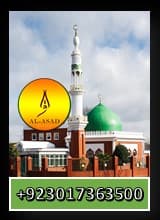WHAT IS A MOSQUE?
Dear Brothers and Sisters, Did You Know?
Dear Brothers and Sisters,In this essay we will learn about what are the history and Mosque fact in Islam? Mosques were known to the English-speaking world long before we called them mosques. In the 15th, 16th, and 17th centuries, we used various different variations of the word—moseak, muskey, moschy, mos’keh, among others—until we finally hit on mosquee, emulating Middle French. The Middle French word had come from Italian word and Old Spanish from the Arabic word use for “temple,” which is masjid. In the early 1700 centuries, we settled on the present spelling, and mosque thus joined other English words related to Muslim worship: mihrab, for the special niche in a mosque that points towards Mecca Mukarrama ; minaret, for the tall slender tower of a mosque; and muezzin, for the crier who, standing in the minaret, calls the hour of daily prayers.
A mosque is the sacred building in which Muslims worship of Allah Almighty. Throughout the whole Islamic history, the mosque was the center of the community and towns formed around this pivotal building. Now-a-days, especially in Muslim countries (Pakistan, Afghanistan, Algeria, Bangladesh, Bahrain, Brunei, Comoros, Djibouti, Egypt, Iran, Iraq, Jordan, Kuwait, Libya, Maldives, Malaysia, Mauritania, Morocco, Oman, , Palestine, Qatar, Saudi Arabia, Sahrawi Republic, Somalia, Tunisia, United Arab Emirates, and Yemen.) mosques are found on nearly every street corner, making it a simple matter for Muslims to attend the five daily prayers. In the West country’s mosques are integral parts of Islamic centers that also contain teaching (Islamic and educational) and Muslims community facilities.
Other elements inside a mosque are:
- Kursi, a desk and a seat for the Koran and for the reader.
- Carpets covering the floor of mosques.
- Incense, especially during the festivals.
- Reliquaries, where bodies, parts of bodies, or belongings of religious personalities are kept.
- Water in the courtyard, both for ablutions and for drinking.
- Dakka, (Bangladesh) a platform from where the muezzin (calling Azan Five Times in a Day) calls for prayer after he has done this from the minaret.
Dear Brothers and Sisters,The Friday is a screed day of the Muslims and comes after the 7th day in a week.The Friday prayer or sermon, Khutba is considered to be compulsory for all Muslims, but the regulations on Khatib and for the Friday mosques (Jami or Cami) are developed over a long period, approximately two centuries. With the strong increase in Jami’s from the 9th century, the term “Masjid” was more and more used for small and insignificant mosques. Early days of Islam, sermons (Khutba) were delivered every day by a Qass, who recited and explained. But the institution of Qass never became widespread and soon disintegrated, and did only continue in Sufism.
History and Etymology for mosque
Dear Brothers and Sisters, earlier mosque, from Middle French, from Old Italian moschea, from Old Spanish mezquita, from Arabic masjid temple, from sajada to prostrate oneself, worship
Some words: Dictionary near mosque
- Moso
- Mososaurus
- Mosotho
- mosque
- mosque swallow
- mosquito
- mosquito bar
Sweet Love words? Need even more definitions?
Subscribe, Like and Share to Islamic & Educational Site and get thousands more Articles free and PDF download
Ruling regarding the leftover material of the Masjid
Question: After new construction of the Mosque, Mosque’s material is left over from the previous construction. What should be done regarding this material?
Answer: Although mentioning the ruling over the leftover material from the previous construction (Mosque), my Master Ala Hazrat has said: If the materials left over from the previous construction of the building is in a usable state and can be stored without the fear of it spoiling, then it should be stored for future use. Otherwise, it may be sold and the money attained from the transaction must be used in the sole construction of the Masjid only. The money get cannot be used for ewers, mats, or lighting etc.
All these affairs should take place under the supervision of the Mutawalli 1 or a trustworthy and reliable individual. The materials should also be sold to a well-mannered Muslim so the materials are not used in an inappropriate or impure place. Any leftover wood which is of no use . However, he should be cautious that he keeps it away from ‘cowpats’ or ‘upla’ (animal dung that is dried then burnt and used to cook etc.). (Fatawa Razaviyyah, vol. 16, pp. 427) Ala Hazrat said the Islamic ruler, and where there is no Islamic ruler, then it is permissible for the Mutawalli of the masjid or neighboring people to sell those things which can no longer be used for the Masjid,
Muslim who buys it can use them in his house such as in the living room, kitchen or any such place where it does not get disrespected. He shall not use them in disrespectful places like toilet etc. as ‘Ulama [Islamic scholars] have commanded to even respect the litter that is swept away from the Masjid. (Fatawa Razaviyyah, vol. 16, pp. 258)
A Mosque Among The Stars PDF Download
Answer book – Fast Facts about our world
Pillars of Faith- Mosque PDF Free Download
Comments on Mosque
Dear Students, what made you want to look up mosque? Please tell us where you read or heard it in the comments Box only. Thanks a Lot.
Our Android Apps
About CEO Al-Asad Online
Hafiz Abdul Hameed
Master In Islamic Studies
(Tajweed, Waqf)
Web Developer/Administrator
Web Content Writer
Blogger, SEO Expert
Graphic Designer
WhatsApp: +92 3017363500

